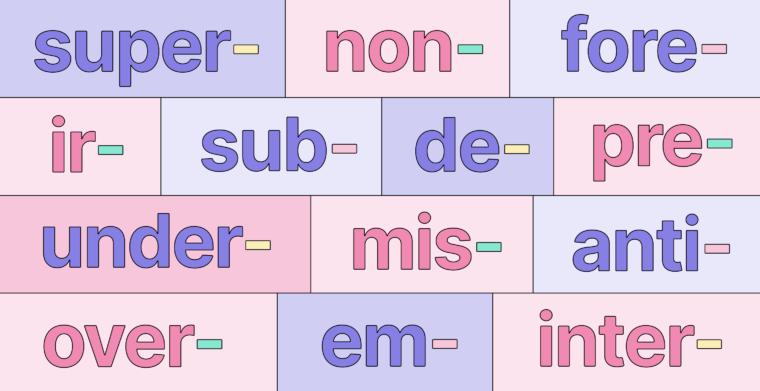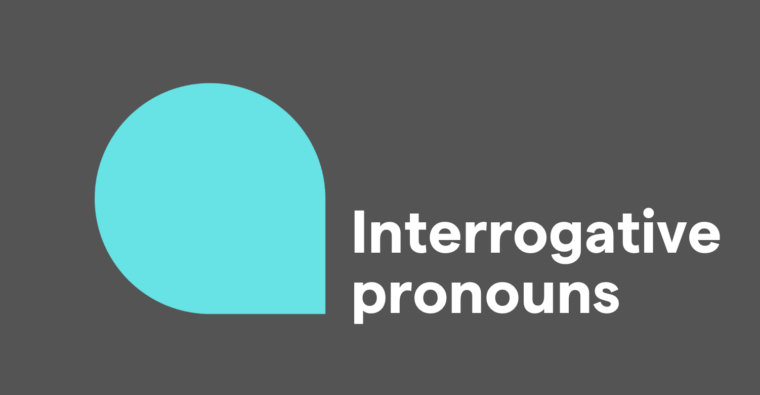
Prefixes are one- to three-syllable affixes added to the beginning of a base word to slightly change its meaning. For example, adding the prefix im- to the base word possible creates a new word, impossible, which means “not possible.”
Prefixes are a regular part of English, and understanding them can greatly improve your vocabulary and reading comprehension. In this quick guide, we explain everything you need to know about prefixes and give plenty of examples of prefixes in English. But first, let’s talk a little about what prefix means.
What are prefixes?
Prefixes and suffixes are types of affixes, which are morphemes added to a base word to modify its meaning. Prefixes are added to the beginning of a word, while suffixes are added to the end.
In English, the most common prefixes and suffixes are usually one or two syllables long, although some, like hetero- and megalo-, are three.
Prefixes always have the same meaning no matter what base word they’re attached to. For example, the prefix re- always means “to do something again”: when used in reread, it means “to read again”; when it’s used in rebuild, it means “to build again.”
When to use prefixes
Prefixes are used mainly to shorten phrases into a single word. For example, instead of saying that someone is “achieving more than expected,” you can say simply that they’re “overachieving,” thanks to the prefix over-. In writing, prefixes are one of the best ways to streamline text and make it more potent.
Prefixes are also important in academic disciplines, specifically to classify subjects. For example, biology is the study of living organisms, based on the prefix bio-, meaning “life,” but geology is the study of rocks and other earth minerals, based on the prefix geo-, meaning “relating to the earth.”
Just be careful using prefixed words with a negative that you don’t create a double negative. Some prefixes, like a-, in-, or un-, are already negative. That means if you say “not unnecessary,” the two negatives cancel each other out, and the meaning is simply “necessary.”
Prefixes and hyphens
From a grammar perspective, the most confusing part about using prefixes is when to use hyphens after them. Basically, some prefixed words use hyphens, and some don’t. To help you understand when to use hyphens with prefixes, here are some basic rules:
Use a hyphen with the prefixes all-, ex– (former), and self–
The prefixes all-, ex-, and self- use a hyphen.
an all-knowing deity
my ex-partner
a self-aware creature
However, be careful with ex- because it has two different meanings—“out from,” and “in the past.” Use a hyphen only when the meaning of ex- is “former” or “in the past.”
exterminator
ex-exterminator (a former exterminator)
Also note that the prefix extra– is different from the prefix ex-, even though they start with the same two letters. The prefix extra- does not need a hyphen like the prefix ex-.
extraterrestrial
Use a hyphen for prefixes with a proper noun
If you’re using a prefix with proper nouns, always use a hyphen.
a trans-Pacific flight
pro-Ukraine
The only exception is transatlantic, a unique word that does not follow the rules of proper nouns.
Use a hyphen if adding the prefix spells a different word
Some words with prefixes, especially re-, are easily confused with other, preexisting words that happen to start with the same letters. If adding a prefix to a word creates a word that already exists, use a hyphen to clear up the ambiguity.
After she recovers from the flu, the gardener needs to re-cover the flower beds.
Use a hyphen to avoid putting the same vowels together
Most of the time, if the last letter of a prefix and the first letter of the base word are the same vowel, you use a hyphen.
re-enter
semi-independent
However, keep in mind this rule has exceptions. In particular, some prefixed words with pairs of o and e do not require a hyphen.
cooperate
preexisting
When a prefix is added to a word that starts with a different vowel, you do not usually use a hyphen.
reappraise
hydroelectric
Remembering which prefixed words use hyphens is confusing even for English experts. If you’re unsure, feel free to use a grammar checker.
Examples of prefixes in English
a-
not, without
amoral, atheist, asexual
after-
following something
afterlife, aftermath, aftereffect
all-
including everything or completely
all-knowing, all-American, all-encompassing
ambi-
both
ambidextrous, ambiguous, ambivalence
anti-
against or opposing
anticlimactic, antibiotics, antiperspirant
astro-
relating to stars or outer space
astronomy, astrology, astronomical
auto-
by oneself
automobile, autobiography, automatic
back-
behind or reverse
backflip, background, backward
bi-
two
bicycle, bisexual, binary
bio-
life or relating to life
biology, biotechnology, biopsy
circum-
around
circumference, circumvent, circumstantial
co-, col-, com-, con-, cor-
together
co-pilot, colleague, correlation
contra-
against or opposing
contradiction, contraceptive, contrarian
counter-
opposition, often as a reaction
counterattack, counterbalance, counterpart
de-
down or away from
de-escalate, descend, devalue
negation or reversal
disapprove, dislike, dishonor
down-
moving from higher to lower
downgrade, download, downplay
ex-
former or in the past
ex-boyfriend, ex-wife, ex-president
ex-
out from
expatriate, exclude, export
extra-
outside of
extradite, extraterrestrial, extracurricular
fore-
before or at the front
forecast, forefront, forearm
geo-
relating to the earth
geology, geography, geofence
hetero-
different
heterosexual, heterogeneous, heteromorph
hind-
in the back or behind
hindsight, hindquarters, hinder
homo-
same
homosexual, homogeny, homophone
hydro-
relating to water
hydroelectric, hydrophobic, hydroplane
hyper-
excessive, above, or over
hyperactive, hyperbolic, hyperventilate
il-, im-, in-, ir-
negation or reversal
illegal, inanimate, irredeemable
in-
toward or within
include, insert, influence
inter-
among, between
international, internet, interact
intra-
on the inside, within
intramural, intravenous, intracellular
mal-
badly
malfunction, malnourished, malevolent
mega-, megalo-
very large
megalomaniac, megalodon, megafauna
micro-
very small
microscope, microaggression, microcosm
mid-
in the middle
midnight, midlife, midseason
mini-
small or less
minimum, minivan, miniature
mono-
one
monochrome, monogamous, monologue
multi-
more than one, many
multiple, multitask, multimillionaire
neo-
new iteration of something
neoclassical, neonatal, neoliberal
non-
not or negation
nonnegotiable, nonstop, nonsense
off-
not standard or away from
offbrand, offsides, offshore
omni-
encompassing all
omnipotent, omnibus, omnivore
on-
in the immediate vicinity
ongoing, onlooker, onset
out-
surpassing or going outside the normal
outperform, outmaneuver, outlier
over-
excessive or going above
overreact, overreach, overstep
pan-
including everything
pandemic, pansexual, panacea
para-
beside or beyond
parallel, paragraph, paranormal
peri-
around or about
perimeter, periscope, peripheral
photo-
relating to light
photography, photosynthesis, photon
poly-
many
polygon, polygamy, polytheism
post-
happening after
postpone, posthumously, postseason
pre-
happening before
prepare, predict, prefix
pro-
in support of
pro-union, pro-democracy, pro-form
pro-
moving forward or advancing
propulsion, progress, proceed
re-
doing something again
repeat, recycle, redo
self-
directed toward oneself
self-conscious, self-assured, self-checkout
semi-
partially, not completely
semiautonomous, semicircle, semiannual
sub-, sup-
below or from a lower position
submarine, suboptimal, subtropic
syn-, sym-
working together
synchronize, symmetry, syndicate
tele-
from a distance
telephone, television, telecommute
trans-
crossing or going beyond
transcontinental, transform, transgender
tri-
three
trident, triangle, triathlon
negation or the absence of
unimportant, unrest, uneventful
under-
beneath or insufficient
undercover, underwear, underestimate
uni-
one
uniform, unite, unicellular
up-
upward or higher
upgrade, upwind, update
with-
moving away from or resisting
withdrawal, withhold, withstand
Prefixes FAQs
What are prefixes?
Prefixes are short one- to three-syllable additions that are attached to the beginnings of words to slightly change their meaning. For example, adding the prefix tri- to the base word angle creates a new word, triangle, which means “a figure with three straight lines and three angles.”
How do prefixes work?
Prefixes generally mean the same thing no matter what word they belong to. For example, the prefixes syn- and -sym mean “to do something together”: When syn- is added to thesis, it makes synthesis, a “combination of ideas to form a theory or system.” When sym- is added to phony, it makes symphony, meaning “music intended for a full orchestra.”
When should you use prefixes?
Prefixes help you use fewer words when communicating. For example, instead of saying that someone is “doing something over and over again,” you can say simply that they’re repeating, thanks to the prefix re-, which means “to do something again.”





